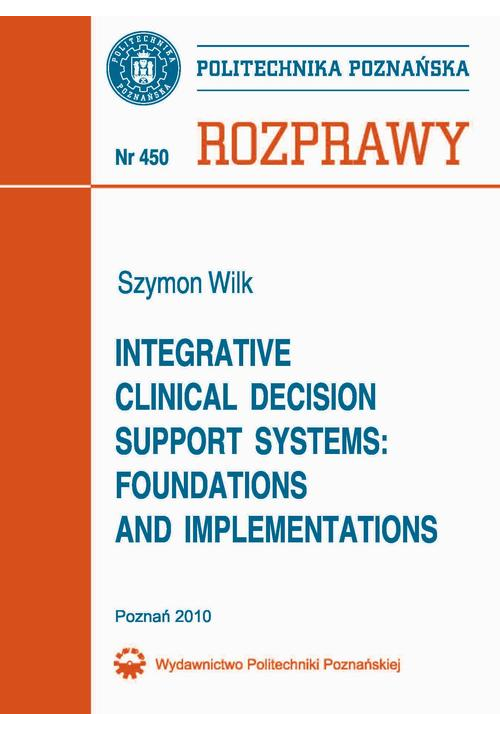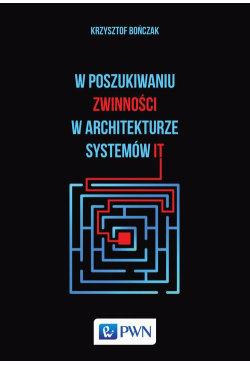
- -14%
ebook Integrative clinical decision support systems: foundations and implementations
Integrative clinical decision support systems: foundations and implementations to książka autorstwa Szymona Wilka wydana przez Wydawnictwo Politechniki Poznańskiej w 2010 roku, napisana po polsku. Jest to fascynująca publikacja, która zgłębia teoretyczne i metodologiczne podstawy systemów wspomagania decyzji klinicznych (CDSS). Skupia się na systemach opartych na konkretnym pacjencie, które pomagają lekarzom podejmować decyzje diagnostyczne i terapeutyczne bezpośrednio w miejscu udzielania opieki.
Książka wprowadza pojęcie "wspomagania decyzyjnego opartego na integracji klinicznej", które obejmuje wszystkie zadania związane z procesem podejmowania decyzji klinicznych, oraz proponuje architekturę teoretyczną dla systemów wspomagania decyzji klinicznych opartych na integracji (ICDSS), znaną jako MET3. Architektura ta łączy zasady systemów wieloagentowych i projektowania opartego na ontologii, aby rozłożyć złożoną funkcjonalność wspomagającą na niezależne jednostki oraz reprezentować różne typy wiedzy klinicznej za pomocą modeli ontologicznych.
Autor omawia także modyfikacje algorytmów indukcji reguł opartych na teorii zbiorów przybliżonych, które pozwalają generować odporne reguły decyzyjne z niespójnych i niepełnych danych. Książka opisuje również ich kombinację, która skutecznie radzi sobie z nierównomiernym rozkładem klas decyzyjnych, co jest typowe dla danych klinicznych.
W celu poprawy dokładności i efektywności wyszukiwania odpowiednich dowodów klinicznych, Wilk przedstawia ramy dla zaawansowanego indeksowania i automatycznego pobierania dokumentów opartych na przeglądach systematycznych badań klinicznych. Dzięki temu można odnaleźć dokumenty istotne w danym kontekście spotkania pacjent-lekarz. Odszukane dowody uzupełniają sugestie diagnostyczne i terapeutyczne, umożliwiając lekarzom podejmowanie bardziej świadomych decyzji.
Książka zawiera również zasady kierujące projektowaniem interakcji w CDSS i ICDSS, które zostały opracowane na podstawie podejść zorientowanych na zadania i użytkowników. Szczególną uwagę poświęcono nowoczesnym platformom obliczeniowym mobilnym, w tym urządzeniom przenośnym.
Architektura MET3 oraz pozostałe proponowane rozwiązania metodologiczne zostały udanie zweryfikowane w praktyce. Opracowano dowody koncepcyjne ICDSS dla dwóch problemów klinicznych (ból moszny u dzieci i zaostrzenia astmy), skonstruowano modele diagnostyczne dla tych problemów, a następnie zaimplementowano ramy indeksowania i pobierania dla zaostrzeń astmy. Wyniki tej weryfikacji oraz doświadczenia z projektowaniem i prowadzeniem badania klinicznego CDSS są szczegółowo opisane w tej publikacji.
Jeśli interesują Cię ebooki, książki elektroniczne, czytanie ebooków lub chcesz pobrać ten ebook w formacie PDF, odwiedź sklep z najlepszymi ebookami i znajdź wydanie elektroniczne tej publikacji cyfrowej. Zanurz się w świecie bestsellerów ebooków i odkryj najlepsze ebooki literatury pięknej oraz innych kategorii!
Spis treści ebooka Integrative clinical decision support systems: foundations and implementations
Acronyms and abbreviations 5Abstract 7
1. Scope and objectives 9
1.1. Scope 9
1.2. Motivations 10
1.3. Objectives 12
1.4. Book organization 14
1.5. Acknowledgments 14
2. An architecture for an ICDSS and its theoretical foundations 15
2.1. Introduction 15
2.2. Conceptual model of decision making implying the MET3 architecture 16
2.3. Related research on patient-specific CDSSs 17
2.4. Methods for developing the MET3 architecture 19
2.5. The MET3 architecture 21
2.5.1. Requirements 21
2.5.2. Goal model 23
2.5.3. Domain ontology 24
2.5.4. Agent model 26
2.6. Discussion 28
3. Methodologies for constructing diagnostic decision models 33
3.1. Introduction 33
3.2. Rough set theory 35
3.2.1. Handling inconsistent and incomplete objects 35
3.2.2. Identifying important condition attributes and assessing their information value 38
3.2.3. Discovering rules in decision tables 40
3.2.4. Using decision rules to classify new objects 45
3.3. Proposed methods for induction of robust decision rules 47
3.3.1. Modifications of existing rule induction algorithms 47
3.3.2. Combination of LEM2* and EXPLORE* to handle imbalanced data 50
3.4. Experimental evaluation of the proposed methods on clinical data 52
3.5. Discussion 55
4. A framework for indexing and retrieval of context-specific evidence 57
4.1. Introduction 57
4.2. Related research 59
4.3. The Cochrane Library 61
4.4. Proposed methods 62
4.4.1. Design of the indexing and retrieval framework.62
4.4.2. Phase 1: identification of core index concepts 65
4.4.3. Phase 2: indexing of evidence-based documents 66
4.4.4. Phase 3: retrieval of evidence-based documents 67
4.5. Discussion 69
5. Principles of designing interactions for an ICDSS 73
5.1. Introduction 73
5.2. Related research on interactions in CDSSs 74
5.3. Methodological foundations of interaction design 75
5.3.1. Framework of interactions 75
5.3.2. Scenario-based design methodology 76
5.3.3. Object-Action-Interface model 76
5.3.4. Eight Golden Rules of Interface Design 77
5.4. Proposed principles for interactions in ICDSSs 77
5.5. Discussion 82
6. Practical applications of the proposed methodologies 85
6.1. Introduction 85
6.2. Implementation of the MET3 architecture 85
6.3. Generic process of constructing diagnostic decision models 87
6.4. Construction of the diagnostic model for pediatric scrotal pain 89
6.4.1. Description of the clinical problem 89
6.4.2. Collected retrospective data 90
6.4.3. Development of possible decision models 91
6.4.4. Evaluation of selected decision models 93
6.5. Construction of the diagnostic model for pediatric asthma exacerbations 94
6.5.1. Description of the clinical problem 94
6.5.2. Collected retrospective data 95
6.5.3. Development of possible decision models 98
6.5.4. Evaluation of selected decision models 99
6.6. Implementation of the evidence indexing and retrieval framework for pediatric asthma exacerbations 100
6.6.1. Identification of core index concepts 100
6.6.2. Indexing evidence-based documents 102
6.6.3. Retrieving evidence-based documents 104
6.6.4. Evaluation of the automatic indexing 105
6.7. Discussion 107
7. Practical evaluation of a CDSS 109
7.1. Introduction 109
7.2. Methods 111
7.2.1. Trial design and implementation 111
7.2.2. Patient enrollment and follow-up 113
7.2.3. Outcome measures and analysis 114
7.3. Results 115
7.3.1. Enrolled patients 115
7.3.2. Accuracies of MET2-AP and physicians 116
7.3.3. Inter-observer agreement 116
7.4. Discussion 118
8. Conclusions 121
8.1. Results and contributions 121
8.2. Future research directions 122
References 123
Streszczenie 137
Szczegóły ebooka Integrative clinical decision support systems: foundations and implementations
- Wydawca:
- Wydawnictwo Politechniki Poznańskiej
- Rok wydania:
- 2010
- Typ publikacji:
- Ebook
- Język:
- polski
- Format:
- Liczba stron:
- 138
- Miejsce wydania:
- Poznań
Recenzje ebooka Integrative clinical decision support systems: foundations and implementations
-
Reviews (0)

Na jakich urządzeniach mogę czytać ebooki?
- -14%















@CUSTOMER_NAME@
@COMMENT_TITLE@
@COMMENT_COMMENT@